For the Life of the World


Servants Formed to Reach: The Liturgy of the Gospel
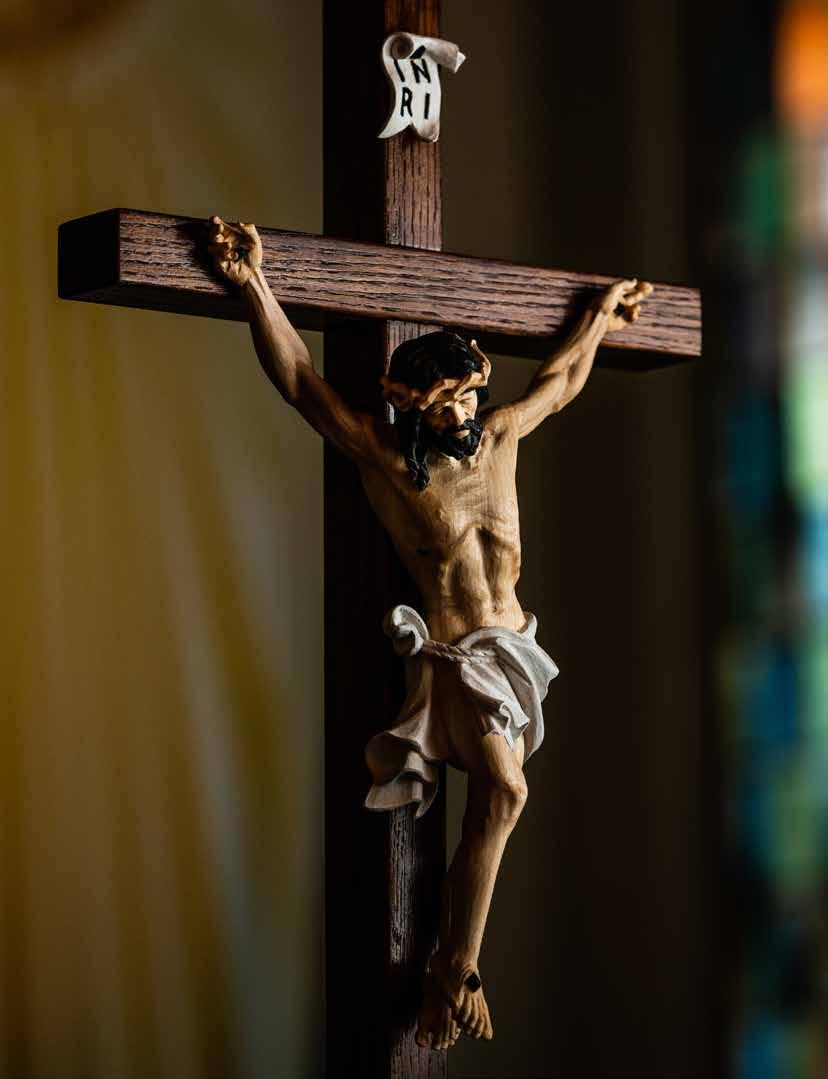
D. Richard Stuckwisch
Servants Formed to Reach:
Confessional Theological Education Arthur
Servants Formed to Reach: The Witnessing Community Mark Wood
CONCORDIA THEOLOGICAL SEMINARY, FORT WAYNE
SPRING 2023
A. Just Jr.
The vision of CTSFW’s founders to couple a clear Lutheran confession with a vigorous missionary effort is at the core of the Seminary’s life and service to The Lutheran Church—Missouri Synod (LCMS), the global Lutheran community, and the church throughout the world. This vision continues to influence the focus of our vibrant, Christ-centered community as we engage and resource the church and world, domestically and internationally, with distinctively Lutheran teaching, practice, and worship.
One of the benefits of a residential seminary is having your horizons stretched and your preconceived notions challenged daily by those around you. In addition to students from across the United States, CTSFW currently has 33 students from 18 different countries on campus, each bringing their personal experiences from the various contexts from which they come.
Our mission and reason to exist is to form servants in Jesus Christ who teach the faithful, reach the lost, and care for all. Our graduates, out of love and concern for the faithful members of their congregations and those in their communities who have yet to know Christ, will:
@ Engage the world as God’s own creation, with attention to cultural questions of the contemporary context from the perspective of the Lutheran confession of the biblical witness.

@ Reach out with the Gospel with theological integrity and passion for those who do not know Christ.
@ Encourage the people of God to support the missio Dei at home and abroad.
How is this lived out on our campus? How do we form students who reach the lost? St. Paul charges Timothy to “preach the word; be ready in season and out of season; reprove, rebuke, and exhort, with complete patience and teaching”
(2 Tim. 4:2). Our Lord further instructs us through St. Peter to “honor Christ the Lord as holy, always being prepared to make a defense to anyone who asks you for a reason for the hope that is in you”
(1 Pet. 3:15). Jesus also commands us to “go into all the world and proclaim the gospel to the whole creation,” promising that “whoever believes and is baptized will be saved, but whoever does not believe will be condemned”
(Mark 16:15-16). Our students, faculty, and staff serve as iron sharpening iron in classroom discussions, through Christ-centered worship, and in all the time spent in between living alongside one another in community. We stretch and challenge one another so that our graduates are prepared to take the saving Gospel of Christ into this hurting world.
There is an urgency to our Lord’s admonitions to prepare and share the Good News. He promises that He is “coming soon” yet wishes that none “should perish, but that all should reach repentance” (Rev. 22; 2 Peter 3:9). I encourage you to be in the Word and receive the gifts our Lord has for you in the Divine Service. Grow in Christ and share His Good News with your neighbor. Consider coming to the Seminary and experiencing this community.
Maybe our Lord is calling you to be one of those who will preach the word and reach the lost. If so, let’s talk. We would love to start that conversation with you.
In Christ,
Lawrence R. Rast Jr. President Concordia Theological Seminary, Fort Wayne
“For God so loved the world, that he gave his only Son, that whoever believes in him should not perish but have eternal life. For God did not send his Son into the world to condemn the world, but in order that the world might be saved through him.” John 3:16-17
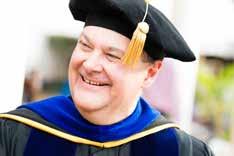
For the Life of the World 2
FROM THE
PRESIDENT
Photo: Erik M. Lunsford/The Lutheran Church—Missouri Synod
CONTENTS
4 Servants Formed to Reach: The Liturgy of the Gospel
D. Richard Stuckwisch
The liturgy is the heart and center of the church’s life, the very thing to which the lost are called by the Holy Spirit through the Gospel. That is to say, the liturgy is not simply a “means to some other end,” but it is the very Kingdom of Heaven here among us in the Word and works of Christ Jesus. Apart from that liturgy, there would be no point or purpose to the mission of the church.
7 Servants Formed to Reach: Confessional Theological Education
Arthur A. Just Jr.
Faith comes through hearing, and hearing through the Word of Christ in a person’s own language. Through Seminario Concordia El Reformador, the Livonian Lutheran Project, Concordia Theological Seminary Taiwan, and mission outreach in Eurasia, former CTSFW students are playing a central role in forming confessional pastors and deaconesses to reach the lost in a language they can understand.
10 Servants Formed to Reach: The Witnessing Community
Mark Wood
For the Life of the World
E. Behning
For the Life of the World is published by Concordia Theological Seminary Press, 6600 N. Clinton St., Fort Wayne, Indiana 46825. No portion of this publication may be reproduced without the consent of the Editor of For the Life of the World by email at FLOW@ctsfw.edu or (260) 452-3153. Copyright 2023. Printed in the United States. Postage paid at Berne, Indiana.
For the Life of the World is mailed to all pastors and congregations of The Lutheran Church—Missouri Synod in the United States and Canada and to anyone interested in the work of Concordia Theological Seminary, Fort Wayne, Indiana.
Unless otherwise noted, all Scripture verses are from the English Standard Version (ESV).
Every One His Witness was designed to “equip Lutherans to be Third Article witnesses telling the Second Article story using their First Article gifts.” It makes a clear and important distinction between the work we do as the Church Gathered (i.e., outreach) and the work we do as the Church Scattered (i.e., witness). But it dismisses the idea that evangelism is a work that we do on our own.
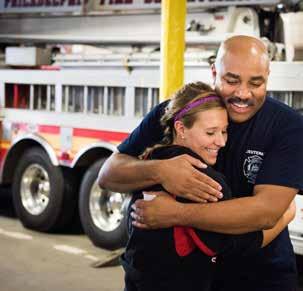
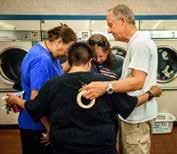
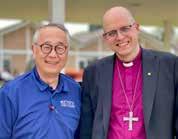
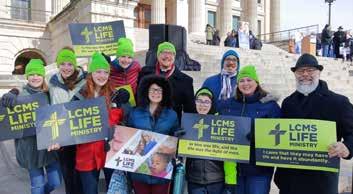
Spring 2023 3
Also in this Issue: Partnering in the Gospel .................. 13 Student Focus: Bryan and Keah Payne ....... 14 Continuing Education Schedule ............ 16 God’s Sure Hands ....................... 18 Faculty Focus: Dr. Geoffrey Boyle........... 20 Reaching the Lost in Latin America ......... 22 Faculty News ........................... 23 The NEW Christ Academy Family Institute .... 24 “It’s the Lord’s Anyway!” ................. 26 Bible Study: Imitators of God .............. 28
Volume Twenty-Seven, Number One FEATURES
PUBLISHER
President PUBLISHER
PRODUCTION
Carrie M. O’Donnell Colleen M.
EDITOR COPY
Trudy
ART
Dr. Lawrence R. Rast Jr.
ASSISTANT
MANAGER
Bartzsch
EDITOR Kristine S. Bruss
DIRECTOR Steve J. Blakey
Servants Formed to Reach: Through the Liturgy
Ibegan my seminary studies in the fall of 1989, which was perhaps not the most ideal time to do so, as others may recall. There were various rumblings within the Synod and even on the Seminary campus at that time, which impacted our formation as future pastors in various ways. No doubt the Lord worked all those things together for the good of His church and for His people, His pastors included, and part of that benefit would surely be the clarifying and sharpening of our understanding of His good gifts.
Among other things, the so-called “worship wars” were really just heating up at that point and causing some division and confusion within the life of the church. For my part, I grew up in a conservative family and was therefore comfortable and familiar with the traditional Lutheran liturgy in a basic and general sort of way. But I didn’t really have a good grasp or understanding of the importance or significance of that liturgical heritage and practice. A deeper appreciation of those treasures would come with time.
A particular point of clarity came in my fourth year at the Seminary, in a missions class with Dr. Gregory Lockwood, which afforded me the chance to look closely at the life and ministry of Wilhelm Loehe. That is when I recognized that, far from being at odds with one another, the liturgy of the Gospel and the mission of the church are really of one piece and in perfect harmony with each other. Indeed, the mission of the church is centered in the liturgy of the Gospel and continues from there into the world.
Understanding “the liturgy” to be the Lord’s good and gracious work of preaching and the Sacraments, shaped especially by the administration of His Supper in accordance with His Word, the first point to be made is that the liturgy is the heart and center of the church’s life, the very thing to which the lost are called by the Holy Spirit through the Gospel.
Regrettably, in my early years at the Seminary I harbored the false impression that one could be either “liturgical” or “missional” in attitude, outlook, and practice. That unfortunate perspective was common in those days, going hand-in-hand with a similar false dichotomy between confessional commitment and evangelical outreach, as though such things were antithetical and incompatible. I wince at the memory of how, as a young seminary student, I more or less accepted such dichotomies as a given. Thankfully, one benefit of our seminary process was that I had the time and opportunity to learn and grow.
In the midst of a liberal and rationalistic age, Pastor Loehe was a staunchly confessional Lutheran in theology and practice, an avid student and practitioner of the historic liturgy, and an ardent proponent and active supporter of outreach and missions at home and abroad. His preaching, pastoral care, and tangible works of mercy were exemplary. He was directly and personally involved in preparing men for the mission and ministry of the church in the United States, and he was instrumental in establishing our own Concordia Theological Seminary as well as helping to start The Lutheran Church—Missouri Synod. He understood that the truth and faithfulness of our pure doctrine is exercised and actualized in the liturgy of the Gospel, and that our confession of the faith is both the impetus and the content of the church’s evangelistic efforts within the life of the congregation and to all the nations of the world.
In Wilhelm Loehe I found a beautiful example of what I had already begun to sense in my classes, in the chapel, and
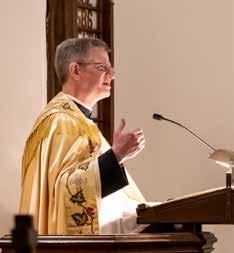
For the Life of the World 4
Photo:
Rick Tribble
Liturgy of the Gospel
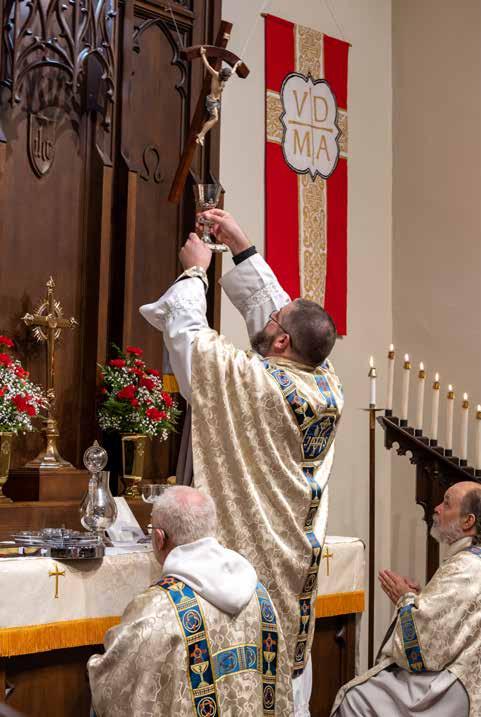
in my fieldwork and vicarage. Theology, liturgy, and the pastoral office were intimately connected and working closely together in the catechesis and confession of Christ Jesus. And these very things were not only edifying my faith and nourishing my life as a Christian, they were forming me to be a pastor of the Lord’s church, to pray and to practice the faith, to preach and teach the Word of Christ, and to administer His precious means of grace to the glory of His name and for the salvation of the lost.
The truth is, the Lord’s liturgy of the Gospel in the preaching of His Word and the administration of His Holy Sacraments is so fundamental to and intertwined with the inner ministry and outward mission of His church, it would be redundant to identify all the ways in which the one informs the other. But given the confusion and false dichotomies that have prevailed at various times and still persist in some places to the present day, it is worth pointing out some of the broad and basic ways whereby the liturgy fuels the church’s evangelistic outreach and actually works to form servants for the reaching of the lost.
Understanding “the liturgy” to be the Lord’s good and gracious work of preaching and the Sacraments, shaped especially by the administration of His Supper in accordance with His Word, the first point to be made is that the liturgy is the heart and center of the church’s life, the very thing to which the lost are called by the Holy Spirit through the Gospel. That is to say, the liturgy is not simply a “means to some other end,” but it is the very Kingdom of Heaven here among us in the Word
Spring 2023 5
Photo: Rick
D. Richard Stuckwisch
Tribble
and works of Christ Jesus. Apart from that liturgy, there would be no point or purpose to the mission of the Church. But as it is, we reach out to the lost for the sake of calling them into the life of the church in the liturgy of the Gospel. Not only that, but what happens in the liturgy—what is preached and heard, given and received there in the liturgy—is what continues to happen in the lives of God’s people within their respective callings and stations. The Word of the Lord which they have heard in the Divine Service is the Word they pray and confess with their families, friends, and neighbors in the world. And the gifts they have received in the Divine Service bear good fruits after their own kind in the charity and good works of the faithful. As they are washed and fed, healed and forgiven, comforted and strengthened by the liturgy of the Gospel in Word and Sacrament, so do they likewise wash and feed, heal and forgive, comfort and strengthen those whom the Lord has laid at their gates and placed alongside them in this body and life on earth. And they are prompted to do so in joyful thanksgiving for the gifts Christ freely gives in the liturgy.
To hand over what we have received from the Lord in doctrine and practice is, of course, precisely what we are given to do—and what we rightly aim to do—in evangelism, outreach, and missions. For what do we have to give that we have not first of all received? And that is true for pastors and laity alike, each of us in his own place. Accordingly, pastoral formation really begins and continues with the experience and exercise of the Christian life in the hearing of the Word of Christ as it is preached, in the washing of the water with His Word in Holy Baptism, in the confessing of sins and the receiving of Holy Absolution, and in the eating of His body and the drinking of His blood in the Holy Communion. This is why fieldwork and vicarage are not just practically and pedagogically important, but fundamental and essential to the formation of future pastors. We cannot do or give what we ourselves are not receiving and relying on.
What is more, to the point at hand, the faithful administration and conduct of the liturgy, in keeping with the Lord’s Word and in continuity with the church’s traditional teaching and practices, is already the primary exercise
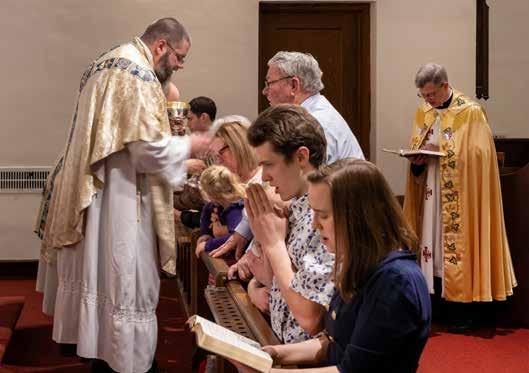
of evangelism, which continues in outreach and the overall mission of the Church. There is such a beautiful continuity between the liturgical work of the pastoral ministry within the life of the congregation and the evangelical life of every Christian within their respective callings and stations.
I am so profoundly thankful for those professors who not only taught me the truth of the pure Gospel in the Seminary classrooms but also exemplified and practiced that confession in the chapel, and likewise for my fieldwork and vicarage pastors who faithfully practiced the Church’s traditional liturgy. As those men preserved and handed over the faith once delivered to the saints, they were teaching me and training me to be a faithful pastor, and they were preparing me to give those gifts of God in Christ Jesus that fill up His people and overflow to the joy and edification of countless others over time.
The Rev. Dr. D. Richard Stuckwisch (richard.stuckwisch@in.lcms.org) is President of the LCMS Indiana District and also serves at Emmaus Lutheran Church in South Bend.
To hand over what we have received from the Lord in doctrine and practice is, of course, precisely what we are given to do—and what we rightly aim to do—in evangelism, outreach, and missions. For what do we have to give that we have not first of all received? And that is true for pastors and laity alike, each of us in his own place.

For the Life of the World 6
Photo: Rick Tribble
Servants Formed to Reach: Confessional
Theological Education
At the Tower of Babel, Moses writes: “And the Lord said, ‘Behold, they are one people, and they have all one language, and this is only the beginning of what they will do. And nothing that they propose to do will now be impossible for them. Come, let us go down and there confuse their language, so that they may not understand one another’s speech’” (Gen. 11:6-8).
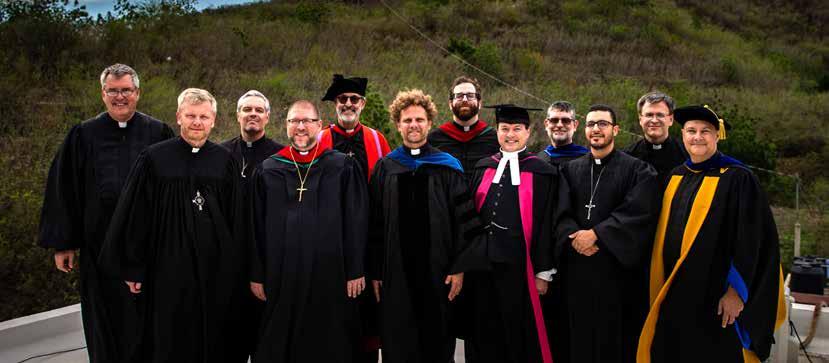
Spring 2023 7
Arthur A. Just Jr.
Fifty days after the resurrection of Jesus on the day of Pentecost, the Holy Spirit came upon the apostles with tongues of fire, and they began to speak in other languages. And when the people gathered there in Jerusalem heard the apostles, “they were amazed and astonished, saying, ‘Are not all these who are speaking Galileans? And how is it that we hear, each of us in his own native language?’” (Acts 2:1-8)
God reversed the confusion of languages at Babel in the coming of the Holy Spirit at Pentecost. In his letter to the Romans, Paul writes: “How then will they call on him in whom they have not believed? And how are they to believe in him of whom they have never heard? And how are they to hear without someone preaching? And how are they to preach unless they are sent? As it is written, ‘How beautiful are the feet of those who preach the good news!’ . . . So faith comes from hearing, and hearing through the word of Christ” (Rom. 10:14-5, 17).
Fundamental to forming pastors, missionaries, and deaconesses to send into the world to reach the lost is equipping them to teach the Good News of Jesus Christ in a person’s own language. This is the lesson of the Tower of Babel and Pentecost.
Since 2017, the Office of International Mission of The Lutheran Church—Missouri Synod (LCMS), along with former students from Concordia Theological Seminary, Fort Wayne (CTSFW), has been reaching out through theological education to people who speak Spanish, English, Mandarin, Farsi, Urdu, and Arabic. A church that reaches the lost in these six languages is covering most of the world.
Theological Education in Spanish: Seminario Concordia El Reformador
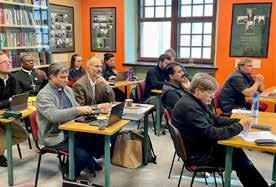
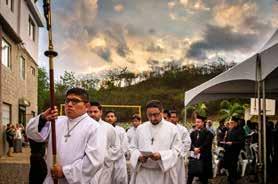
For many years, Pastor Ted Krey (MDiv, CTSFW 2001), Regional Director of Latin America and the Caribbean, knew that we needed a seminary in the northern part of Latin America. Sadly, during his tenure as a missionary, many seminaries and theological colleges were either closed
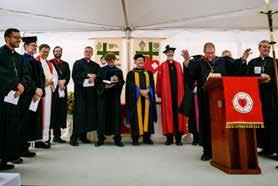
or moved away from a confessional Lutheran focus. So in the fall of 2017, Pastor Krey convened pastors from Latin America and the United States to form a confessional Lutheran seminary in Santiago de los Cabelleros in the Dominican Republic on the same location of a mercy center. Since that time, Centro de Misericordia y Seminario Concordia El Reformador (Concordia the Reformer Seminary) has prepared 20 pastors and 100 deaconesses and organized four theological conferences for church workers from all over Latin America and the Caribbean. (Read more about the work in this region on page 22 of this issue.)
Theological Education in English: The Livonian Lutheran Project
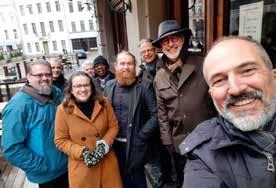
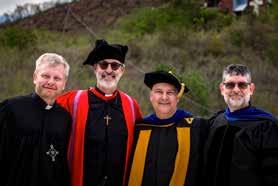
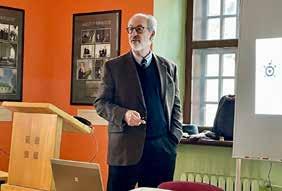
In September 2020, Dr. John Bombaro (MDiv, CTSFW 2007) and his colleague Dr. Charles Cortright launched the Livonian Lutheran Project, an online bachelor’s-level curriculum of confessional Lutheran theology in partnership with the Riga Luther Academy in Latvia. This Englishspeaking route to ordination for pastors and consecration for deaconesses is for indigenous men and women in mission fields where it is not possible to establish their own seminary. It will also make Lutheran theological education available to a wider audience of anyone interested in furthering their knowledge of Scripture and the Lutheran Confessions.
Most of the students are from European countries—Italy, Bulgaria, Ireland, Switzerland, Romania, Czech Republic, and the Russian Federation—but there are also eleven students from Pakistan. Since most of the classes are taught in a Zoom classroom, you can imagine the excitement when all the students met for the first time in a residential course I taught on Lutheran liturgy in Wittenberg, Germany, over Reformation Day in 2021. The course was so successful they held another face-to-face course on diakonia, which I taught in Riga in April 2022, alongside Archbishop Jānis Vanags, a distinct honor.
Theological Education in Mandarin: A Confessional Lutheran Seminary in Taiwan
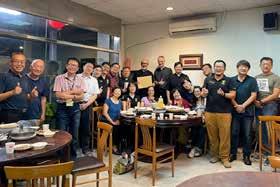
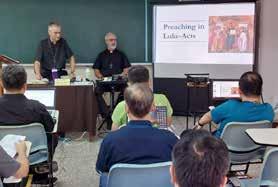
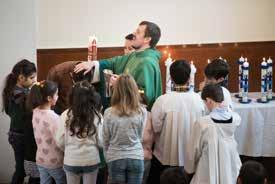
Pastor Joseph Lu came to CTSFW to study in our PhD in Missiology program from China Lutheran Seminary (CLS) in Hsinchu City, Taiwan, which trains pastors for the Chinese Evangelical Lutheran Church (CELC). He served the seminary for many years as business manager and professor. Little did he realize that during his years of study and attending services at Kramer Chapel that he would return to Taiwan to spearhead the first confessional Lutheran seminary in Taiwan that would teach its courses in Mandarin.
During the pandemic, I chaired a task force to discuss and make plans for the formation of this seminary, working with Dr. Lu; Dr. Michael Paul, an LCMS missionary in Taiwan; Pastor Charles Ferry, the Regional Director for Eurasia; and Pastor Andrew Miao, the president of CELC.
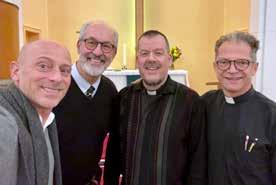
In September 2022 I taught a three-week course at CLS in Hsinchu City to all the pastors, pastoral students, and deaconesses of the CELC and other Lutheran denominations. The course on pastoral theology in Luke-Acts presented the core principle of the curriculum for the new Mandarin seminary, namely, that theology is done through the pastoral acts of baptizing, preaching, and the Lord’s Supper. This course was both continuing education for CELC pastors and deaconesses as well as the first course in a colloquy program for other Lutheran pastors who want to join the CELC.
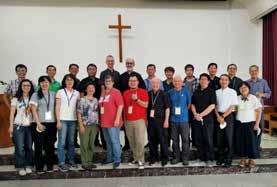
Plans for the new seminary, now called Concordia Theological Seminary Taiwan (CTST), were finalized during my 2022 visit. It will start its residential program in September 2023. In the meantime, CTSFW professors will be traveling to Taiwan this year to teach other courses in the colloquy program.
Theological Education in Farsi, Urdu, and Arabic
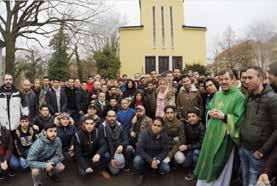
In November 2021, Dr. Christian Tiews (DMin, CTSFW 2017), along with myself and Dr. John Bombaro, were invited
to Berlin for a meeting with former CTSFW student Dr. Gottfried Martens, pastor of Trinity Lutheran Church in BerlinSteglitz, a Lutheran congregation of some 1,500 members, 1,400 of whom hail from Iran or Afghanistan. Pastor Martens was overwhelmed by his work in reaching out to the Iranian and Afghan refugees in Berlin and asked us to help him develop a program of theological education to reach the lost in the languages of Farsi, Urdu, and Arabic both within Europe but also in places like Iran and Afghanistan, where people are starving for the Gospel. Dr. Martens passionately implored us to reach out to these people in their own language to explain the basics of Christianity. He noted that there are well over 120 million Farsi speakers for us to reach.
As a result of that meeting, three 10-minute instructional videos were developed on Christ’s atonement, Baptism, and the Lord’s Supper—key components of Christianity that resonate strongly with Persians and other Middle Eastern people. Our idea was to record the videos in English, overdub them in Farsi, Urdu, and Arabic, and distribute them around the globe via the internet. These videos will be available soon.
Faith comes through hearing, and hearing through the Word of Christ in a person’s own language. Through Seminario Concordia El Reformador, the Livonian Lutheran Project, Concordia Theological Seminary Taiwan, and mission outreach in Eurasia, former CTSFW students are playing a central role in forming confessional pastors and deaconesses to reach the lost in a language they can understand, be it Spanish, English, Mandarin, Farsi, Urdu, or Arabic.
The Rev. Dr. Arthur A. Just Jr. (Arthur.Just@ctsfw.edu) is Professor of Exegetical Theology at Concordia Theological Seminary, Fort Wayne, and also serves as Associate Executive Director of the LCMS Office of International Mission –Theological Education.
 Photo: Erik M. Lunsford/The Lutheran Church—Missouri Synod
Photo: Erik M. Lunsford/The Lutheran Church—Missouri Synod
Servants Formed to Reach: The Witnessing
Mormon missionaries happened to come to the home of a classmate during our first year of studies at Concordia Theological Seminary. Although he was much further along in his training (a full quarter ahead of me in his studies), my classmate didn’t hesitate to call on me for assistance. He had heard that I came to the Seminary from a Mormon community in Arizona and was well-versed in witnessing to Mormons. For their part, the Mormon missionaries were eager to have a crack at the Lutheran student who had lived in the shadow of one of their revered temples.

For the Life of the World 10
Photo: Erik M. Lunsford/The Lutheran Church—Missouri Synod
Witnessing Community
Several members of our class were able to meet with these young and zealous missionaries multiple times before one of the Mormons started to show signs of embracing what we were teaching. Unfortunately, the other missionaries escorted her out of my home, and they never returned. We were disappointed that the opportunity to continue to share God’s Word with them was over. We were also disappointed that it brought an end to this intimate and intense shared experience for us. The bonding that took place through that experience continues to this day.
Witnessing to those Mormon missionaries with my classmates provided some valuable insights about witnessing as a member of a community of believers. Some years later, I was able to put those insights into practice as the pastor of evangelism for a congregation in Florida. Recognizing that the work of evangelism didn’t and shouldn’t rest solely on my shoulders, I started teaching the members of the congregation a relational, contextual approach to witnessing. With 1 Peter 2:9 as a guiding light, I embraced my role of equipping the Priesthood of Believers to be the witnesses they are called to be. Once again, the value of having a community of witnesses was apparent. People I could not reach as a parish pastor were already woven into the lives of the members of our congregation. Equipping those members multiplied many times over what little a pastor of evangelism could do on his own.
Equipping people to be active and effective witnesses of Jesus came with its own challenges. The only Lutheran evangelism resource available at the time was Dialogue Evangelism 2 (DE2).
While DE2 had been a useful resource for many years, we found that training people to go door-to-door to witness to strangers was ineffective in our context. We realized it was time for an approach to evangelism that addressed our current culture and context while being faithful to Lutheran doctrine and practice. Creating a resource was a challenging undertaking. Fortunately, the sound theological training I received at CTSFW and experiences like witnessing to the Mormon missionaries with my classmates provided the foundation for developing that resource.
A decade or so after creating the evangelism resource for equipping people in the parish I served, I was called to the Office of National Mission of The Lutheran Church—Missouri Synod (LCMS) and tasked with creating an evangelism resource. It was a rare and tremendous opportunity to create a resource for evangelism that was Lutheran from the ground up. Taking the wider context of the Synod into consideration while developing this resource, I found that the theological training and experiences of CTSFW were indispensable for crafting what is now the Every One His Witness evangelism program.
Every One His Witness was designed with the Priesthood of Believers in mind. The resource’s purpose is to “equip Lutherans to be Third Article witnesses telling the Second Article story using their First Article gifts.” It makes a clear and important distinction between the work we do as the Church Gathered (i.e., outreach) and the work we do as the Church Scattered (i.e., witness). But it dismisses the idea that evangelism is a work that we do on our own. Even
Witnessing in isolation negates the importance of being a part of a witnessing community. It promotes the idea that talking about Jesus with your nonchurched neighbor at a backyard barbecue or hanging out with a nonbeliever at a coffee shop to have a “spiritual conversation” is somehow sufficient. It fails to recognize that the work of a witness involves both bringing the Word of Christ to people and then bringing people to the Word of Christ—that is, to connect the people to whom we witness to a community that gathers around a local altar and pulpit to continue to receive the good gifts of God.

Spring 2023 11
Mark Wood
Photo: Erik M. Lunsford/The Lutheran Church—Missouri Synod
when an individual believer is witnessing without another believer present, he or she remains part of a witnessing community. That individual brings the training, catechesis, prayers, and encouragement of many other Christians into each witnessing situation. Even more so, the individual is accompanied by the Holy Spirit, whose constant presence binds us to the community of believers. We are never alone when witnessing, because, as members of the body of Christ, we are never alone.
The idea that we are on our own when witnessing is one of many bad ideas about evangelism that have caused God’s people guilt, shame, and angst over their call to share the Good News of Jesus with lost people. Unfortunately, some of those bad ideas are also popular ideas—even among Lutherans. Sadly, the influences of other confessions have shaped (actually, misshaped) our understanding of witnessing. While we can clearly see the false teachings of “decision theology” that have influenced some evangelism approaches (e.g., getting someone to pray the “sinner’s prayer”), other false teachings are more subtle and have found their way into our thinking about evangelism. One of those ideas is that the work of witnessing is
done once we’ve told someone about Jesus—in other words, witnessing in isolation as though evangelism were solely a “me and Jesus and this unbeliever” endeavor.
Witnessing in isolation negates the importance of being a part of a witnessing community. It promotes the idea that talking about Jesus with your nonchurched neighbor at a backyard barbecue or hanging out with a nonbeliever at a coffee shop to have a “spiritual conversation” is somehow sufficient. It fails to recognize that the work of a witness involves both bringing the Word of Christ to people and then bringing people to the Word of Christ— that is, to connect the people to whom we witness to a community that gathers around a local altar and pulpit to continue to receive the good gifts of God.
Witnessing in isolation is often piously presented as being more focused on “Kingdom growth” than on congregational growth. But the reality is that the Kingdom grows (when and where God wills) when congregations grow. The Kingdom is not made up of disconnected individuals, but of the one body of Christ called, gathered, enlightened, sanctified, and kept by the Holy Spirit. This same Holy Spirit calls
us to be “Third Article witnesses telling the Second Article story using their First Article gifts” not as a burden, not as obligation, and not in isolation, but as a joyful privilege as part of a community of witnesses who are loved, redeemed, and sanctified.

Many years and many miles have passed since we were first-year seminary students witnessing to four Mormon missionaries in my living room. But I clearly remember what brought the one young lady to tears as she realized the truth of what we were sharing: my classmate stepping through each phrase of the Apostles’ Creed and then asking “Do you believe this is true?” It was an approach that I (the well-versed witness to Mormons) had not considered. That experience opened my eyes to the value and strength of being a part of a witnessing community and was the beginning of finding comfort, strength, and joy in knowing that, as Christ’s witness, I am never alone.
The Rev. Dr. Mark Wood (mark.wood@lcms.org) serves as Director of Witness and Outreach and Revitalization at The Lutheran Church–Missouri Synod.
The Kingdom is not made up of disconnected individuals, but of the one body of Christ called, gathered, enlightened, sanctified, and kept by the Holy Spirit. This same Holy Spirit calls us to be “Third Article witnesses telling the Second Article story using their First Article gifts” not as a burden, not as obligation, and not in isolation, but as a joyful privilege as part of a community of witnesses who are loved, redeemed, and sanctified.

For the Life of the World 12
Photo: Erik M. Lunsford/The Lutheran Church—Missouri Synod
Partnering in the Gospel
Jacksonville, Florida: Black Clergy Caucus
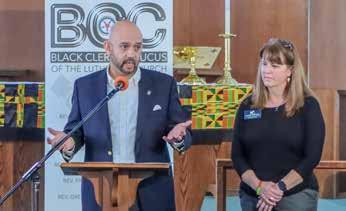
Several representatives of CTSFW attended the annual meeting of the Black Clergy Caucus (BCC) in Jacksonville, Florida, February 7–9, where they learned more about the priorities of LCMS Black Ministry and talked about ways in which CTSFW might partner with the BCC to reach the next generation of church workers. As part of this effort, CTSFW’s media team filmed about a dozen short interviews with participants, asking them to reflect on who started the conversation with them about entering the ministry. The videos are part of a new “Start the Conversation” project now underway at the Seminary.
Rancho Cucamonga, California: Concordia Sunday
The Rev. Dr. Timothy Puls, Director of Alumni and Church Relations at CTSFW, served as guest preacher for a “Concordia Sunday” at Shepherd of the Hills Lutheran Church (SOTHLC) in Rancho Cucamonga, California, January 29. The work of three Concordia schools was celebrated: Concordia University Irvine (CUI), Concordia Seminary, St. Louis (CSL), and Concordia Theological Seminary, Fort Wayne (CTSFW). Dr. Puls’ sermon, “Snapshots of Life and Light in Christ!” was based on Titus 1:1-4. Representatives from all three schools participated in a Q & A during a reception after the service.
Admission Director Rev. Matt Wietfeldt and Chief of Staff
Carrie O’Donnell share details about CTSFW’s Dr. Rosa J. Young Scholarship, the full-tuition guarantee, and the new Christ Academy Family Institute launching this summer.
From left, front row: Les Schaefer (SOTHLC vicar), Dr. Puls, Diana Barich (SOTHLC member and 2020 CTSFW Miles Christi recipient), Michael Flynn (CSL Advancement officer); back row: Jonathan Howard (CUI Advancement officer), Mike Parrish (SOTHLC vicar), and the Rev. Dr. Jonathan Brandenburg (pastor of SOTHLC).

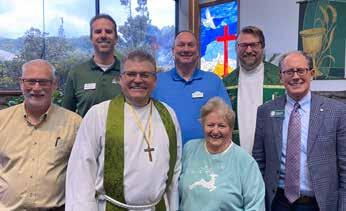
Fort Wayne, Indiana: LCMS-LCK Dialogue
Representatives of The Lutheran Church—Missouri Synod (LCMS) and the Lutheran Church of Korea (LCK) gathered for a “Fraternal Church Relations Dialogue” January 16–17 at CTSFW. During the meeting, the group discussed several topics of interest, including women’s ordination. Three presenters gave papers on the subject, including Dr. David Scaer, The David Scaer Professor of Biblical and Systematic Theology at CTSFW, Dr. Roland Ziegler, The Robert Preus Professor of Systematic Theology and Confessional Lutheran Studies at CTSFW, and Dr. Adam Hensley, who recently accepted a call to join the faculty at Concordia Seminary, St. Louis. The January dialogue in Fort Wayne was a follow-up to a meeting of LCMS and LCK leaders held in April 2022 in St. Louis.
Spring 2023 13
Rev. Meredith Jackson, JayPBSig Creations, photographer
Student Focus: Our Life Is a Mission
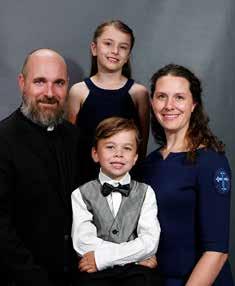
Bryan and Keah Payne began their life together with an international adventure, serving in Africa with the Peace Corps from 2007–2010. They came back to the US and tried to live the “settled life,” but after a mission trip to Haiti, they knew the settled life was not for them. Now in their final year at Concordia Theological Seminary, Fort Wayne (CTSFW), the Paynes hope to serve again someday on the international mission field, this time as rostered church workers of The Lutheran Church—Missouri Synod (LCMS).
A Shared History of Service
“Once you know the need, once you know what God has going on around the world, it’s hard to keep your blinders on. To see the need, to know the need, deep down, you realize that God can use you to answer that need to spread the true, pure Gospel.”
Long before they enrolled at CTSFW—Bryan in the MDiv program, and Keah in the Deaconess Studies program—the Paynes were drawn to church service. Both lifelong Lutherans, they met while working at a Lutheran summer camp in Oklahoma. They married in college and soon found themselves heading to Africa with the Peace Corps.
“My great-grandfather worked for the USDA, which took him to Kenya and also India,” said Bryan. “Growing up, we had things from Africa and India all over the house, and we heard stories about him helping farmers in Kenya. I’ve always wanted to help people throughout the world, like my great-grandfather.” Keah was similarly inspired by stories she heard from relatives who traveled to Africa for mission work.
The Paynes served in Malawi as environment volunteers, with Bryan pursuing a master’s degree in cultural and ecological preservation. They completed a two-year stint and extended their stay for a third year, which they served in a national park in Africa. This opened a door for them to share their faith.
“We had the opportunity to work with the park staff and the villages surrounding the park,” said Keah. “Most of our work focused on dryseason irrigation, teaching incomegenerating activities, and assisting a
non-governmental organization, but we also spent time with anyone who wanted to just talk with us and learn about the churches back home that supported the projects we were carrying out.”
“We weren’t allowed to proselytize unless they asked,” added Bryan. “And they did ask. ‘Why would the churches do this?’ That would open a door to talk about Jesus Christ.”
The Paynes returned to the US and tried to settle down, as everyone encouraged. They got stable jobs, bought a home, and had their first child in 2014. After four years in the US, they went on a short-term mission trip to Thomassique, Haiti. When they returned, Keah recalls telling Bryan, “We can’t keep living this life.” They decided to put their home on the market, and it sold in 24 hours.
Preparing to Spread God’s Word: Theological Education
The Paynes visited both LCMS seminaries and the LCMS Office of International Mission before enrolling at CTSFW. They knew they could work in missions without seminary training, but they wanted to be prepared theologically to share God’s Word. “Our pastors said, ‘If you want to do this long-term, if you want to have the most impact, you need to be a pastor,’” said Bryan. “They hadn’t even thought at that point about Keah being a deaconess.”
For the Life of the World 14
The Paynes weren’t thinking about it either until their second Prayerfully Consider Visit, when they connected with a group of deaconesses. “If we end up in missions,” Bryan said, “a deaconess can do so many things that a pastor or male missionary can’t do. There are situations in other cultures where it’s just not acceptable for me to be there, but it’s very acceptable for Keah to be there.”
Both Paynes say they’ve learned a great deal in their years at the Seminary. For Bryan, the opportunity to learn theology and the Lutheran Confessions from some of the most world-renowned professors, not just in classes but also in discussions with professors and students from around the world in a less formal setting over coffee, lunch, or gemütlichkeit, has been very formative. Being able to put these things into practice during his fieldwork and vicarage year has deepened his understanding.
“One of the main things I’ll take with me is the necessity to stand on the
Confessions,” he said. “The Lutheran Confessions are a treasure. Maybe we don’t understand how integral they are to confessing the pure doctrine of the Bible—the Gospel of Jesus Christ. Yet there it is. We have it. It’s right there in the whole Book of Concord. Standing on the Confessions is something we will have to do. When Luther makes his famous statement, ‘Here I stand. I can do no other,’ sometimes we have to do that for the Gospel.”
For Keah, learning alongside residential and distance deaconess students has provided a wonderful opportunity to learn from each one of them in their places and stages of life. These experiences have strengthened her ability to work with people and share God’s love with them. Wherever she ends up, she’ll be thankful for all the resources that she’s received. “The Deaconess Program is so full of resources, and they’re constantly giving them to us, every quarter. There’s so much available. It’s a good place to be a sponge.”
The Work Ahead
The Paynes are now looking forward to Call Day in April, when they’ll find out what God has in store for them next. Although they’ll be happy to serve wherever called, they would love to go back to Africa.
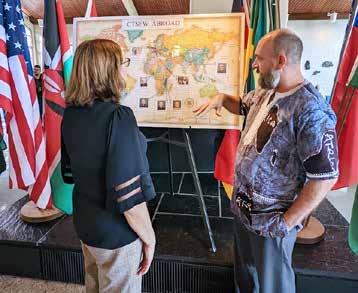
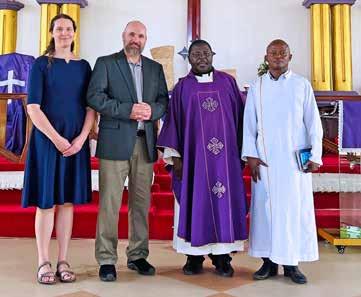
“We were once asked why we would want to leave the U.S. when the need for pastors is so great here,” said Keah. “Our response was, the need for pastors is great everywhere, but not many are willing or able to go to other countries to serve. People all over the world long to hear the pure Gospel and teachings of Jesus Christ. Lutheran churches in other countries are growing much faster than in the U.S., so the need for missionaries is great.”
There’s so much need. It stays with you,” Bryan added. “Once you know the need, once you know what God has going on around the world, it’s hard to keep your blinders on. To see the need, to know the need, deep down, you realize that God can use you to answer that need to spread the true, pure Gospel.”
Spring 2023 15
Kristine Bruss
The Paynes at the church of Rev. Odolous Gyunda, (MA, CTSFW 2020), in Shinyanga, Tanzania, in 2022.
Bryan Payne speaks with a visitor at an international event on the Seminary campus.
Continuing Education
n In-person learning n Growth n Fellowship
KANSAS CITY, MISSOURI
June 5–7
Dr. Brian German
Luther and the Psalms
ST. AUGUSTINE, FLORIDA
June 5–7
Dr. Cameron MacKenzie
Luther's Theology in Today's World
TRUMAN, MINNESOTA
June 7–9
Prof. John Pless
The Catechism in the Life of the Congregation
GRAND RAPIDS, MICHIGAN
June 12–14
Dr. David H. Petersen
21st-Century Preaching: Gleaning Method—Luther, Gerhard, Walther
KNOWLES, OKLAHOMA
June 12–14
Dr. R. Reed Lessing

The Book of Jeremiah: Overcoming Life's Sorrows
TRAVERSE CITY, MICHIGAN
June 12–14
Dr. Charles Gieschen
Confronting Confusion about the End Times: Paul's Letters to the Thessalonian Church
CARLYLE, ILLINOIS
June 13–15
Dr. Peter Scaer
The Book of Acts: The Church Comes into Being
ST. CLOUD, MINNESOTA
June 13–15
Dr. Gregory Schulz
Ministry of the Word in an After-Word World
LAWRENCE, KANSAS
June 15–17
Dr. Jon Bruss


The Seven Ecumenical Councils
ALBUQUERQUE, NEW MEXICO
June 19–23
Prof. John Pless
Pastoral Care from Luther’s Letters of Spiritual Counsel
CLAREMONT, NORTH CAROLINA
June 19–21
Dr. Benjamin Mayes
Pastoral Care in Cases of Divorce and Remarriage



NASHVILLE, TENNESSEE
June 19–21
Dr. Peter Scaer
Justification by Faith and the Resurrection: Luke, Acts, and Romans
VALPARAISO, INDIANA
June 19–21
Dr. Richard J. Serina Jr.
Lutheran Ecclesiology in a Digital Age













WESTMINSTER, MASSACHUSETTS
June 19–21
Dr. Adam Koontz
Against the Stream: Paul's Missionary Gospel in Hard Times
MOUND CITY, MISSOURI
June 20–22
Dr. Chad Kendall
Protreptics: An Approach to Holy Conversation Outside the Church
OCALA, FLORIDA
June 26–28
Dr. Peter Scaer
The Abolition of Man: The War on Our Humanity
SHAWANO, WISCONSIN
June 26–28
Dr. Todd A. Peperkorn


Advanced Sacramental Preaching
ST. PAUL, MINNESOTA
June 26–28
Dr. William Weinrich
The Gospel of John
ANAHEIM, CALIFORNIA
June 27–29
Dr. Carl Fickenscher and Prof. John Pless
Lutheran Preaching Today
Opportunities 2023
MARYSVILLE, WASHINGTON
June 27–29
Dr. Jeffrey Pulse
No More Peek-a-Boo Jesus: The Christology of the Old Testament
GRASS VALLEY, CALIFORNIA
July 10–12
Dr. Lawrence R. Rast Jr.

The History of the LCMS and Applications for Today
RIVERTON, UTAH
July 10–12
Dr. Jon Bruss
The Reformation of Worship: Scriptural Background and Key Texts, 1523-1580
AUSTIN, TEXAS
July 13–15
Dr. Geoffrey Boyle
O Lord, Open My Lips: Praying the Psalms with Christ and His Church
CLEARWATER, FLORIDA
July 17–19
Dr. R. Reed Lessing
The Book of Jeremiah: Overcoming Life's Sorrows
LITTLE ROCK, ARKANSAS
July 19–21
Dr. Scott Stiegemeyer
What Does It Mean to Be Human?
DAVENPORT, IOWA
July 24–26
Dr. Adam Koontz
The Gospel Always Grows: Evangelism and Apologetics in the Book of Acts

FLATHEAD LAKE, MONTANA
July 31–August 4
Dr. John Nordling










Ancient Slavery and the Modern Christian
MECHANICSBURG, PENNSYLVANIA
August 8–10
Dr. Geoffrey Boyle
An Unlikely Shepherd: Reading Zechariah in Light of Christ
More class and registration information
For additional classes or to register online: Visit ctsfw.edu/CE or scan the QR code. To register by phone with credit card: Call LeeAnna Rondot at (260) 452-2204.

DECATUR, ILLINOIS
August 14–16
Dr. R. Reed Lessing Lamentations
SILVER BAY, MINNESOTA
August 14–18
Dr. Ryan Tietz

Where Are You? Old Testament Lament and Pastoral Care


CUPERTINO, CALIFORNIA
August 15–17
Dr. Charles Gieschen
Who Is Jesus? Confronting Current Christological Controversy
AUBURN, MICHIGAN
August 21–23
Dr. Thomas Winger
Paul’s Letter to the Church in Ephesus
LYNCHBURG, VIRGINIA
August 29–31
Dr. James Bushur
Theology of the Second Century
FORT WAYNE, INDIANA
September 25–27
Dr. Adam Francisco
Apologetics for the 21st Century

CHATTANOOGA, TENNESSEE
October 12–14
Dr. Jeffrey Pulse
All the World: The Missiological Foundations of the Old Testament
Coming Soon!
ORANGE, CALIFORNIA
COUNCIL BLUFFS, IOWA
LAKEWOOD, WASHINGTON
LISBON, NORTH DAKOTA
God’s Sure Hands: CTSFW Serving in Sweden to Reach the
We sometimes comprehend God’s sure hands only later in life. I felt exactly this way when the STM program in Gothenburg, Sweden, launched in 2014. From my early childhood, Scandinavia—more precisely Norway—had a very significant place in my life. I was baptized and confirmed by Norwegian missionaries, and I often played with Norwegian missionary kids. My father, Rev. Dr. Shigeru Masaki (DD, CTSFW 2009), served in a Lutheran church body that was planted by the Norwegian Lutheran Mission (NLM). I spent a year in Norway myself and graduated from a boarding high school near Trondheim.
Years later, when I worked on a PhD dissertation in early 2001, my topic pulled me into archive studies in Lund, Uppsala, and Stockholm. In fact, I also visited Gothenburg to discuss my dissertation with those who would later become my dear colleagues. Dr. Daniel Johansson, academic dean and STM coordinator at the Lutheran School of Theology in Gothenburg (LSTG), was an organist when I first met him on this trip. Who could imagine that a Japanese researcher of Swedish 19thcentury liturgy and a young organist in the village of Frillesås would administer an STM program together some twenty years later?
God’s hands were surely there throughout the history of the STMGothenburg program. Back in 1989, a visit of Rev. Gunnar Juelsson to CTSFW, particularly his conversations with Dr. Robert Preus, led him and his colleague, Dr. Bengt Birgersson (DD, CTSFW 2006), to found LSTG in 1993. More recently, in 2006 and the following years,
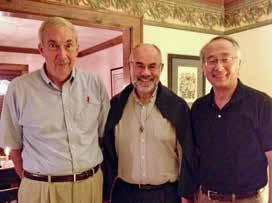
LSTG sent five Swedish and Finnish students to CTSFW for STM studies. These students asked LSTG’s board to request formally that CTSFW consider opening an STM extension site in Gothenburg. The members of the board embraced the report of the students, who had been deeply impressed by rigorous academic studies of confessional Lutheran theology together with rich liturgical life at CTSFW. They asked if more pastors could experience the same. CTSFW responded favorably. As preparation for the program got underway concerning the structure of the program, budgeting, accreditation, etc., the Lord’s sure hands appeared again. Before they had even heard of the STM-Gothenburg proposal, some in the US were moved by the Lord to provide funding for solid confessional Lutheran training for the churches in Scandinavia. By 2014, when years of preparatory work for the program was being finalized, funding for this program was already in place!
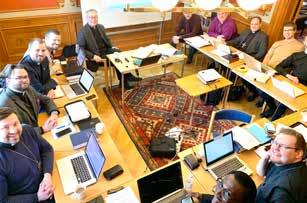
The Lord has gathered to this program forty men now, with six more about to join. Students have come from eighteen countries, including Sweden, Finland, Norway, Iceland, Denmark, Latvia, Russia, Czech Republic, Ukraine, Romania, Moldova, Ghana, Rwanda, Ethiopia, Israel, Spain, Venezuela, and Uganda. The original purpose of strengthening Nordic and Baltic Lutheran churches is unchanged. In recent years, however, we have opened the door to a limited number of pastors from Africa. As of February 2023, eleven students have graduated.
The program has received high praise from accrediting agencies. As noted by one accreditor of the Association of Theological Schools (ATS), “The program has cultural and contextual integrity, operating with sensitivity to the culture of the students and their ecclesial context. It is engaging their concerns and supporting their ministries. The program is assisting the students to think through the issues facing their churches and is encouraging them to conduct research and write papers and theses concerning what is important to them rather than what we think vital from the US point of view. The faculty are exhibiting great models for students both as scholars and pastors. There is a peer collegiality among the students that goes beyond political and cultural barriers. This

For the Life of the World 18
2.
3.
1.
Lost Internationally
Naomichi Masaki
program exhibits what a faith community like this can do beautifully.”
We are very grateful to hear such positive comments. What is even more gratifying is the fact that our students and graduates are reaching the lost in their respective ministerial contexts in so many countries. The Lord is blessing their ministry in their congregations, at their seminaries (in Latvia, Russia, Norway, Finland, Ghana, etc.), through their international collaborative work, and in their church leadership (four as bishops, others as provosts, deans, a seminary president, and secretary of the International Lutheran Council).
What a privilege it is for our Seminary to reach the lost internationally in this way, particularly together with our colleagues at LSTG. It is simply beyond our imagination, witnessing to our Lord’s sure hands in all of this. There is a line in the book of Isaiah: “all that we have accomplished you have done for us” (26:12b). This is most certainly true! We ask for your prayers and support as we continue our work in this region.
The Rev. Dr. Naomichi Masaki (Naomichi.Masaki@ctsfw.edu) is Director of the STM Program, Director of the PhD Program (Theological Studies), and Professor of Systematic Theology at Concordia Theological Seminary, Fort Wayne.
1: From left, Dr. Christopher Barnekov, Dr. Bengt Birgersson, and Dr. Naomichi Masaki. Dr. Barnekov is responsible for the Bo Giertz Fund at CTSFW. Dr. Birgersson was a prime “mover” of the STM-Gothenburg program.
2: A class photo in front of the LSTG’s main building. Students from Sweden, Finland, Norway, Latvia, Iceland, Russia, Ukraine, Ghana, and Rwanda are shown here together with some of the faculty and an ATS accreditor.
3: A classroom where STM courses typically take place at LSTG.
4: The third commencement in March 2022. Back row from the left, Prof. Jonatan Ådahl (OT), Dr. Rune Imberg (Church History), Dr. Bengt Birgersson (emeritus, Pastoral Theology), Dr. Timo Laato (NT), Dr. Daniel Johansson (NT, academic dean), Dr. Torbjörn Johansson (Dogmatics, rector), Dr. Naomichi Masaki; front row from the left, Rev. Otto Granlund, Evangelical Lutheran Mission Diocese of Finland), Rev. Vesa Pöyhtäri (Society of Laestadian Peace), Rev. Gints Graudins (Evangelical Lutheran Church of Latvia).
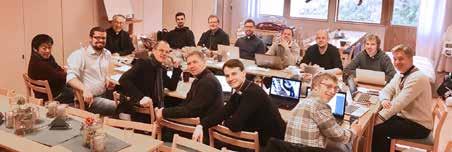
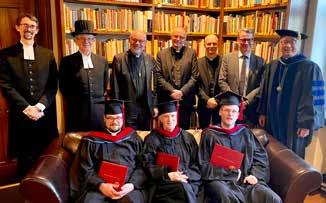
5: Dr. Masaki teaching a class.
6: Dr. Naomichi Masaki and Bishop Dr. Juhana Pohjola of the Evangelical Lutheran Mission Diocese of Finland, who was an important initial contributor to the program.

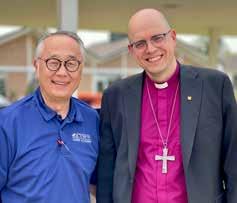
7: Holding a class at Immanuel Lutheran Church of the Mission Province in Sweden in Gothenburg.
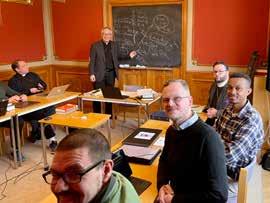
Interested in supporting the Lord’s work through the STM-Gothenburg program? You can send a check designated for the Bo Giertz Fund to Concordia Theological Seminary, 6600 N. Clinton St., Fort Wayne, IN, 46825.
Thank you for your support!
Spring 2023 19
4.
5.
6.
7.
Faculty Focus: The Pastoral Professor
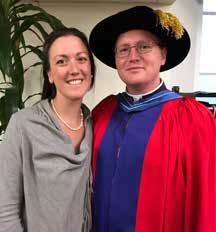
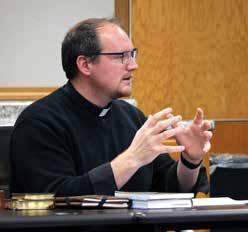
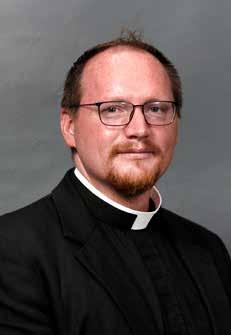
The Rev. Dr. Geoffrey Boyle, who earned his MDiv at Concordia Theological Seminary, Fort Wayne (CTSFW), in 2009, returned to CTSFW last fall after accepting a call to serve as Assistant Professor of Pastoral Ministry and Missions and Director of Field Education. In addition to his teaching responsibilities, he also mentors ten first-year students. With more than a decade of parish experience, wide-ranging theological interests, and a love of talking theology, Dr. Boyle is well positioned to be a trustworthy guide to pastoral ministry.
The Path to Lutheranism
Dr. Boyle, thoroughly conversant in all things Lutheran, came to Lutheranism later in life. Raised a Roman Catholic, he was initially exposed to the Lutheran faith through his wife, Nicole, who in high school invited him to go on a mission trip with her youth group to Mexico.
“Nikki initially told me the trip would involve building houses, but we actually ended up teaching VBS for a week,” he recalls. “I had to read the Bible to prepare these Bible stories and sketches and act them out. That’s the first time I ever consciously remember reading the Bible. It was very influential.”
After enrolling at the University of Michigan, Boyle got involved with Campus Crusade, teaching Bible studies and working with a discipler. Things were going well until the topic of Baptism came up, and Boyle learned how divisive a topic it could be.
“I was called into my discipler’s office for simply assuming that Baptism saved. I wouldn’t have known that any other Christian didn’t think that. I was very naïve at that point. And here I was being told, ‘No, it’s just a symbolic work.’ I vividly remember being given Wayne Grudem’s Systematic Theology as the proof and at that point realizing how unscriptural it was.”
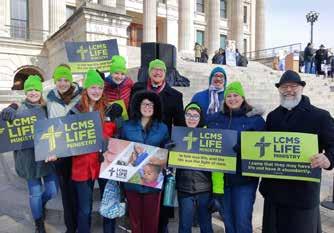
For the Life of the World 20
Boyle
Kristine Bruss
He decided to learn more about Baptism, studying the topic in an early church history class and reading Lutheran resources given to him by Nicole’s uncle, a Lutheran pastor, and their pastor at the University Lutheran Chapel in Ann Arbor. “After going through all that, I said to myself, ‘I think I’m a Lutheran.’”
Around the same time, several people were telling him they thought he should be a pastor. “I was all excited about that, then I found out that I should be a Lutheran to go to a Lutheran seminary; in fact, they require it,” he says with a laugh. He completed catechesis, became a Lutheran, and enrolled at CTSFW in 2005.
Fort Wayne Formation
“I came to the Seminary as an outsider,” Dr. Boyle said. “I didn’t know any of the behind-the-scenes stuff. In my senior year of college, I listened very regularly to Issues, Etc. It had me up on some of the things, but I didn’t know the lingo, the acronyms, the assumptions, or the people.” Nonetheless, he loved being at CTSFW.
He and Nicole, who was studying to be a deaconess, were assigned as fieldworkers to Redeemer Lutheran Church in Fort Wayne, a congregation with “a uniquely liturgical emphasis,” in Dr. Boyle’s words. “I had never been to a church that chanted, and that was going on there and in Kramer Chapel, as well, and I started to love it. Kantor [Richard] Resch put in a lot of work to help me learn how to chant. Coming into the Seminary I had zero liturgical inkling, but I had a very different formation.”
A year at Westfield House in England and a vicarage at St. John in Wheaton, Illinois, reinforced what Dr. Boyle was learning. “Throughout, all I knew was a very liturgical, confessional, ‘strong church body’ sort of approach to these things. I would say it formed in me a way of understanding why we do what we do, according to what we believe.”
After graduating, Dr. Boyle spent over a decade in the field, serving two congregations in Wichita, Kansas. He also earned a PhD in Old Testament from the University of Toronto, the seeds for which had been planted when he was a CTSFW student.
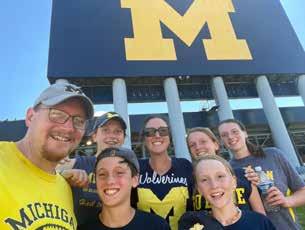
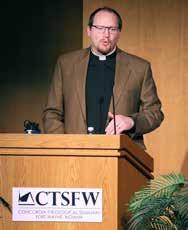
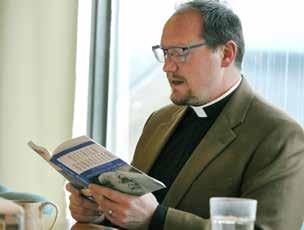
From Pastor to Professor
Dr. Boyle is now sharing what he’s learned with students, mentees, and the wider church. The shift from parish pastor to professor has been “a little strange,” but Dr. Boyle has found good outlets for his pastoral impulses.
“I love getting to spend all this time with the first-years. I know all of them. I get to lecture them once a week about how to think and be a pastor. [His advice to fieldworkers: Don’t be weird. Don’t be weak. Don’t be a jerk.] It’s formative for them, but it also provides an outlet for the pastoral ministry side of me.”
CTSFW’s revamped mentorship program provides another opportunity to act as a pastor. Dr. Boyle spends time every week with the students he mentors. They read together. They pray together. Dr. Boyle serves as a sounding board, and he’s been able to offer pastoral care for some who are struggling.
“I appreciate that my role here as a professor is not something opposed to or even alongside of the pastoral ministry but has very much a pastoral side within it.”
Spring 2023 21
Reaching the Lost in Latin America Pastoral Formation for Latin America Symposium 2023
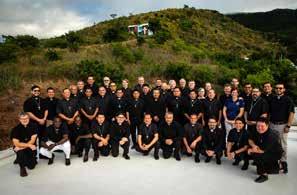
 Don Wiley
Don Wiley
The first in-person symposium for the students of the Pastoral Formation for Latin America (FPH) program convened January 10–13, 2023, at Seminario Concordia El Reformador (SCR, Concordia the Reformer Seminary) in Santiago de los Caballeros, Dominican Republic, under the theme “The Presence of God in Jesus.” The program, a joint effort between SCR and Concordia Theological Seminary, Fort Wayne (CTSFW), began offering distance courses in 2015 to assist sister church bodies of The Lutheran Church–Missouri Synod throughout Latin America in the preparation of pastors. Students and mentors arrived at SCR from Mexico, Guatemala, Panamá, Cuba, Venezuela, and Bolivia.
Symposium presenters included the Rev. Dr. Arthur Just (CTSFW, “The Preaching Office and Pastoral Care”), the Rev. Dr. Roberto Bustamante (SCR, “Basic Aspects of a Theology of the Divine Service”), the Rev. Sergio Fritzler (SCR, “Pastoral Care and the Liturgy”), and myself (“Pastoral Visitation”). The symposium included several practical, hands-on workshops, and each day was punctuated by Matins and Vespers.
One highlight was an afternoon excursion to a mission location in a large neighborhood of over 52,000 families known as “Cienfuegos” (“100 fires”) in the municipal district of West
Santiago. All residential students at SCR have fieldwork assignments, like our CTSFW students, but they also engage in outreach to plant new congregations. Our team of six walked from house to house, greeting those who were on their porches or outside. We offered a prayer, gave them a copy of Portales de Oración (Portals of Prayer), and told them that in the near future we would have a congregation in the area.
The people with whom we spoke not only readily received our greeting and gladly chatted with us about Christ, but they also invited us into their homes—a notable difference from the typical visit in
the US. The afternoon culminated with a visit to the “seed” effort in that region, an outreach to a volleyball team that trains after classes at the local school. From the initial outreach to that group, contacts were made in the neighborhood that have already resulted in several baptisms and the beginning of confirmation and adult instruction classes.
The seed of the Gospel is planted, and by God’s grace and in His time it will grow, so that some of “the lost” shall be among the faithful who are taught with the pure Word and nourished with the blessed Sacraments of Christ by pastors prepared at SCR.
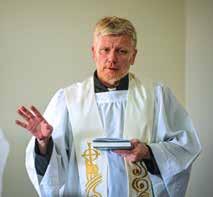
What an honor and blessing to participate in this work of our Savior! What an honor and blessing that CTSFW is a partner in this effort to prepare faithful Lutheran pastors for service in Christ’s church among our sister Lutheran churches to reach the lost in Latin America!
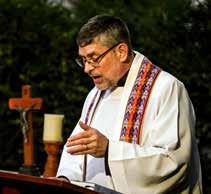
For the Life of the World 22
The Rev. Dr. Don Wiley (Don.Wiley@ctsfw.edu) is Assistant Professor and Chairman of Pastoral Ministry and Missions and Director of the SMP Program at Concordia Theological Seminary, Fort Wayne.
Faculty News
The Rev. Dr. John Nordling, Professor of Exegetical Theology, contributed two chapters to Athens and Wittenberg: Poetry, Philosophy, and Luther’s Legacy, edited by James Kellerman, R. Alden Smith, and Carl P.E. Springer (Brill, 2023). The volume, part of Brill’s “Studies in Medieval and Reformation Traditions” series, explores the influence of Greek and Latin classics on Luther and early Protestantism. Nordling’s chapters include “Nugatory Nonsense: Why Luther Rarely Cites Catullus” and “Influence and Inspiration: Archias and Staupitz as Didactic Models for Cicero and Luther.”
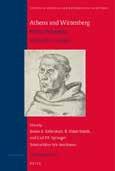
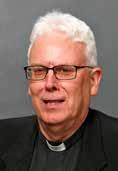
Fort Wayne Lutherans, including CTSFW faculty, staff, students, and families, came out in force January 28, 2023, for the annual March for Life held by Right to Life of Northeast Indiana in downtown Fort Wayne. The Rev. Dr. Peter Scaer, Professor of Exegetical Theology and President of the Board of Directors of Right to Life Northeast Indiana, offered prayers at the event and joined his fellow Lutherans as they sang hymns during and after the march.

“Quite a crowd, quite a scene!” Dr. Scaer wrote in a Facebook post. “Others stayed [after the march], many marveling, having never heard, I think, such strong hymnody outside or in. Lutherans really do sing. And it culminated, as you might expect, in a rousing rendition of ‘A Might Fortress.’”
Eleven CTSFW faculty members—Dr. Geoffrey Boyle, Dr. Jon Bruss, Dr. Charles Gieschen, Dr. Gifford Grobien, Dr. Arthur Just, Dr. Naomichi Masaki, Dr. John Nordling, Dr. David Scaer, Dr. Peter Scaer, Dr. Ryan Tietz, and Dr. Roland Ziegler—presented papers and participated in panel discussions during the annual Symposia, held at CTSFW January 17–20. Over 300 participants attended the event, which also featured plenary papers from guest speakers Dr. Bernard Bull (Concordia University, Nebraska), Dr. Adam Francisco (1517), Dr. Daniel Johansson (Luther School of Theology, Goethenburg, Sweden), and Dr. Steven Mueller (Concordia University Irvine). Recordings from the 2023 Symposia will be available in April. The next Symposia will be held at CTSFW January 16–19, 2024.
Above, left to right: Dr. Gieschen, Dr. Tietz, and Dr. Just interact at one of the CTSFW Symposia panel discussions.
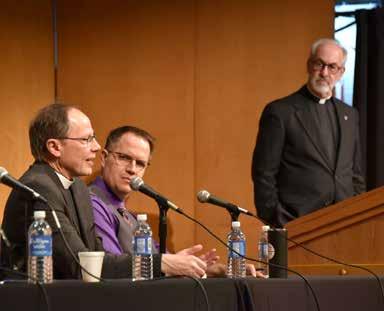
Spring 2023 23
Photo courtesy of Steve Blakey
Nurturing Strong Families in the Church: The NEW Christ Academy Family Institute
Matthew Wietfeldt
Concordia Theological Seminary, Fort Wayne (CTSFW), is excited to announce the newest addition to its Christ Academy offerings: The Christ Academy Family Institute (CAFI). The inaugural Family Institute will be held June 15–17, 2023, right before our Christ Academy High School program begins.
Since 1999, Christ Academy has helped students and families walk through the vocational discernment process through Confirmation, high school, and college programs. We’ve been thrilled to see the response to these programs, all of which provide an opportunity for students to learn more about their faith, explore seminary life firsthand, and build connections with other young Lutherans.
While our existing Christ Academy programs are accomplishing their purpose, we’ve continually looked for additional ways to serve families and the wider church. One possibility has come to mind time and again: support Lutheran families.
Over the years, parents, pastors, and youth church workers have regularly asked us for assistance beyond our
established Christ Academy programs as they teach and raise the youth of our church. We’re ready to help. In a world where families are increasingly under pressure, the Christ Academy Family Institute is poised to offer valuable resources and support, helping families grow in their faith and navigate the challenges of modern life.
At the heart of CAFI’s mission is a belief that strong families are the foundation of a healthy and thriving church. One key to building those strong families is recognizing the essential role of parents in the spiritual development of their children. CAFI programs will equip parents with the tools they need to lead their families in the faith. Whether you’re a newly married couple, a growing family, an empty nester, or a
worker who walks alongside families, the Institute has something to offer.
Healthy relationships are essential, too. The Family Institute is committed to equipping families with practical tools and skills for strengthening relationships in a variety of areas, such improving communication in a marriage, navigating the challenges of parenting, or strengthening relationships with children.

Strong families are the backbone of the church, providing a foundation for faith and community. The Christ Academy Family Institute is dedicated to strengthening families and promoting a solid confessional Lutheran upbringing, helping families grow in faith and in their relationships with one another.
We hope you’ll be able to join us this summer, right before our high school programs, and maybe even bring a student or two with you. God’s richest blessings as you go about caring, raising, and praying for the families of our church.
The Rev. Matthew Wietfeldt (Matthew.Wietfeldt@ctsfw.edu) is Director of Admission at Concordia Theological Seminary, Fort Wayne.

For the Life of the World 24
Concordia Theological Seminary, Fort Wayne (CTSFW), is excited to offer a new program in conjunction with Christ Academy, Christ Academy Family Institute.
Christ Academy Family Institute
June 15–17, 2023
Christ Academy Family Institute (CAFI) focuses on those who walk alongside young people considering church work vocations—their parents, families, and youth-focused church workers. CAFI builds on the same core foundations of all Christ Academy programs: worship, learning, and fun time in community.
Family Institute Goals
1) Help participants raise godly and faithful families.
2) Resource participants for this task.
3) Strengthen marriages and families.
Who should attend?
Christ Academy Family Institute is perfect for parents, families, and church workers interested in growing in their care and love for one another and passing on the faith to future generations.
For more information or to register: Visit the Events page of CTSFW at ctsfw.edu/Events, or scan the QR code here.
Christ Academy: Timothy School & Phoebe School
June 18–July 1, 2023
Timothy School and Phoebe School are open to those who are entering their freshman year through those who have completed their senior year of high school. Space is limited. Apply today! ctsfw.edu/CA
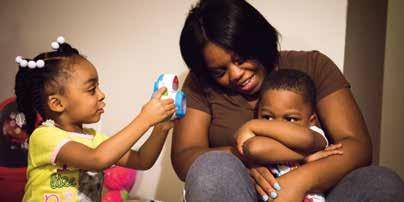
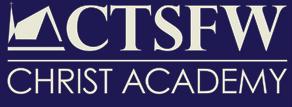
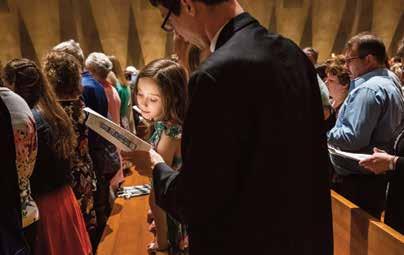
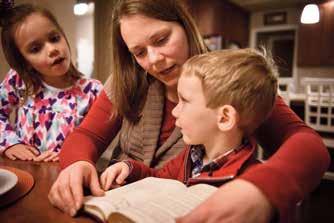

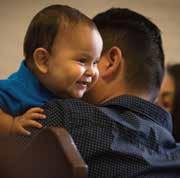
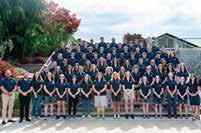
Spring 2023 25 NEW
THIS SUMMER!
It’s the Lord’s Anyway!”
Timothy Puls

“The earth is the Lord’s and the fullness thereof, the world and those who dwell therein.” Psalm 24:1
“We give Thee but Thine own, Whate’er the gift may be; All that we have is Thine alone, A trust, O Lord, from Thee.ˮ LSB 781:1
Six years ago I met a wealthy 90-year-old widow at an independent living center in Chicago, Illinois. Throughout her small apartment were pictures of her family and samples of her quilting and cross-stitching, which she once loved to do. When I would visit, she would often serve me coffee and a danish while I discovered more about her life and shared updates on the progress of the Seminary and our students.
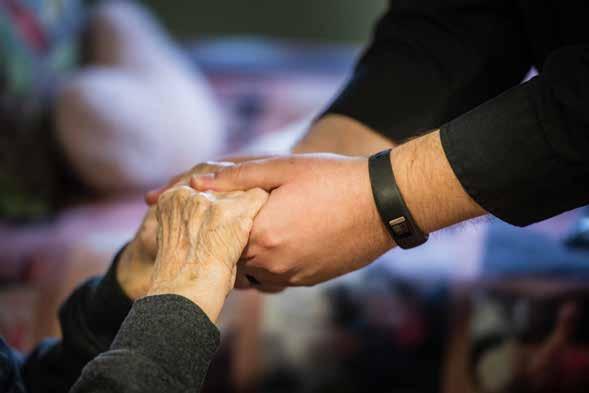
For the Life of the World 26 “
PROFILES IN GIVING
Photo: Erik M. Lunsford/The Lutheran Church—Missouri Synod
The last time I saw her, before the Lord called her to her eternal rest, she made out a check to Concordia Theological Seminary, Fort Wayne (CTSFW), Indiana, and gave it to me saying, “Pastor, don’t forget this; it’s the Lord’s anyway!” Her words struck me, and have stuck with me ever since! Many pastors have shared a similar experience. You assume that you are the only one bringing a message of good news, comfort, and encouragement to someone else. However, when you least expect it, the person you visit actually shares something memorable, comforting, and astounding to you as well.
Those words—“It’s the Lord’s anyway!”—are a short but full commentary on Psalm 24:1 and the hymn verse on the previous page. Many other Scriptures reinforce and expound this same teaching. God is the maker and preserver of all things in both heaven and on earth (Psalm 95:1-7) as well as the One who possesses all riches, honor, power, and glory in both heaven and on earth, now and forever (Rev. 5:13). Yet this same God also intimately chose you in Jesus Christ to be His dear child (Eph. 1:4) and promised it before time began (Titus 1:2). Later, He revealed to us His Son, Jesus Christ, who shed His sacrificial blood, which still flows from His cross, to redeem you and everything you have to serve Him and your neighbor. This wise woman knew this quite well, which is why she told me, “Pastor, don’t forget this; it’s the Lord’s anyway!”
Ownership in our modern world is really an illusion, because nothing is ever really yours, nor goes with you when you die. You only entrust it to others. No earthly possession, including house, car, or money, nor your life, body, or family are ever yours. It is all on loan from God for you to manage what He, the true owner, has entrusted to you. “It’s the
Lord’s anyway!” still motivates me every day and fills me with greater joy because it reminds me of our purpose.
CTSFW is entrusted by the LCMS to prepare pastors to preach the Word of God, herald the good news of Jesus, and announce the forgiveness of sins in His name. We also prepare deaconesses to serve people in merciful ways. What is more important than sharing the Gospel? Nothing! Therefore, it must be supported!
Those words—“It’s the Lord’s anyway!” —are a short but full commentary on Psalm 24:1 and the hymn verse on the previous page. Many other Scriptures reinforce and expound this same teaching. God is the maker and preserver of all things in both heaven and on earth (Psalm 95:1-7) as well as the One who possesses all riches, honor, power, and glory in both heaven and on earth, now and forever (Rev. 5:13). Yet this same God also intimately chose you in Jesus Christ to be His dear child (Eph. 1:4) and promised it before time began (Titus 1:2).
Every gift CTSFW receives from your wealth, no matter the amount, is a gift and blessing from God. Monthly, annual, and estate gifts all enable us to train future servants of God to preach the Word that others know God’s eternal salvation plan for them as well. So keep up the good work, dear friend, and thank you for all you do, since “it’s the Lord’s anyway” to bless the work of Christ’s kingdom!
The Rev. Dr. Timothy Puls (Timothy.Puls@ctsfw.edu) is Director of Alumni and Church Relations at Concordia Theological Seminary, Fort Wayne.

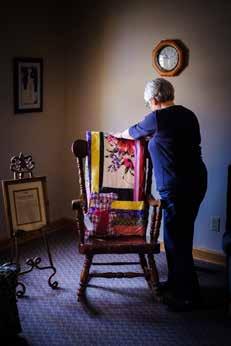
Spring 2023 27
Photo: Erik M. Lunsford/The Lutheran Church—Missouri Synod
Imitators of God: Walking in Faithfulness for the Sake of the Lost
Santi Keinbaum
Warning! The words you are about to read may change how you view your life as a Christian (and I hope they will!). In a sermon that Martin Luther preached on 1 Peter 2, he spoke these striking words:
We live on earth only so that we should be a help to other people. Otherwise, it would be best if God would strangle us and let us die as soon as we were baptized and had begun to believe. For this reason, however, He lets us live that we may bring other people also to faith as He has done for us.
I hope these words of Luther help you understand better one of the aspects of your baptismal identity. As radical as those words may seem, they are filled with only truth. Is it not true that the baptized are sent to share the wonderful gifts of forgiveness, reconciliation, and salvation that He gives? Is it not true that while you help your neighbor with things of the body, you can also share with him or her the wondrous works of your Savior by speaking the Word of God?
In baptism you were sealed by the Lord to give you the assurance of your forgiveness of sins and certainty of salvation. You surely know that, but did you know that in your baptism
you turned into a (local) missionary? No, I’m not saying you need to take a trip overseas to join a mission effort (although if you can do that, do it!). Begin by considering those around you. You will likely find many who are confused, broken, hurting, and lost. You are to proclaim His mercies to all of them.
Grounded in your baptismal identity, I invite you to consider every moment of your life as an opportunity to, by His grace, be an active part in the mission of God, to see yourself as a missionary, as someone who has the high honor of proclaiming His Word in words and deeds to those near you.
I. Our Triune God: A Missionary in Essence
Read Genesis 3:14-15. What deep expression of emotion did the Lord show when He saw that Adam and Eve (humanity) disobeyed?
Read John 3:16; John 12:31-33. What did the Father do to fulfill His promise of bruising/defeating the serpent?
Read 1 John 4:14; John 3:17. What two key verbs could you identify that reveal the mercy of God in action for the benefit of humanity?

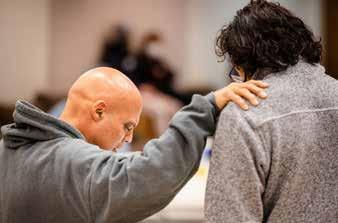
For the Life of the World 28
IN THE WORD
Bible © Jorisvo Dreamstime.com
Read Luke 1:35, 2:1-7. The Father, moved by compassion, gave the promise of salvation and sent the Savior. In what season of the church year do we acknowledge that the Father effectively sent His Son, the Savior?
Read John 15:26. Who bears witness about the redemptive work of the Son? Who sends the Holy Spirit into believers?
III. Imitators of God: Marching on to Reach the Lost
Read 2 Corinthians 4:13. What are two works of the Spirit that prepare you to reach the lost?
Read 1 Timothy 2:4. What does this text say about God’s aspiration for every human being?
God is moved by His compassion toward His creation. In that compassion, a missionary movement can be found within our triune God. The Father sends the Son to the world, the Father and the Son send the Spirit to His church, and the Holy Spirit sends you to announce the Good News of forgiveness, reconciliation, and salvation.
II. Imitators of God: Getting Ready to Reach the Lost Read Acts 2:38. How was the Holy Spirit given to you?
Read Ephesians 2:8-9 and the Small Catechism, Explanation to the Third Article of the Apostles’ Creed. How do you explain that you believe in Jesus Christ? How does this passage debunk the belief that faith is a rational, human decision?
Read Acts 1:8. What will the Holy Spirit empower you to do? Read Joshua 1:9; Matthew 28:20; 1 Corinthians 6:19. You are baptized into Christ, so you have the assurance that God’s presence is with you at all times. How is the presence of the Almighty God in your life an encouragement to you as you prepare to share His work of salvation?
Read Ephesians 6:10-18. In your zeal to show the light of Christ in the midst of this hurting world, you will find many obstacles. St. Paul makes clear that we are in battle against Satan. What are the God-given tools that you can use to overcome Satan and other challenges as you share the Word of God with your neighbor? Make a list of those tools.
Read Ephesians 6:19-20. St. Paul requests the congregation at Ephesus to pray for him. For what purpose? What is the significance of prayer in the life of those who have a zeal to share the Gospel? Did you ever pray for a missionary? Did you ever request someone’s prayer as you prepare to talk with your neighbor about the marvelous works of God?
Read 1 Corinthians 9:16-23. In his passion to reach the lost, St. Paul describes himself as someone who makes an effort to understand and assimilate the cultural differences between him and his neighbor. In the diverse “melting pot” in which we live, how culturally flexible can you be in order that the Good News may be effectively proclaimed, that “by all means I might save some?”
Read Romans 3:23-26, 5:8-11; John 3:16-17. What are the basic truths that you are called to share with the lost?
Read Romans 10:14-17. As you read this Bible study, many are already lost forever, but many need to be rescued by His grace. Can you think about people around you who need to hear the Good News of Jesus crucified and resurrected? Perhaps a family member? Perhaps someone you know who fell away from the church? Using the blessings that God has given you, like His own presence in your life, the Holy Scriptures, the ability to pray, and your pastor, would you feel more open and confident to speak the words of Truth to the lost and hurt? The Lord calls His people to send them as His proclaimers. How does your congregation prepare to share the Good News of God in words and deeds?
Read Ephesians 5:1. Are you willing to imitate your missionminded Lord and to bear with high honor the proclamation of His saving work to all?
Let us pray.
Almighty God, in Your kindness You cause the light of the Gospel to shine among us. By the working of Your Holy Spirit, help us to share the Good News of Your salvation that all who hear it may rejoice in the gift of Your unending love; through Jesus Christ, Your Son, who lives and reigns with You and the Holy Spirit, one God, now and forever.
The Rev. Santi Keinbaum (santikeinbaum@gmail.com) is pastor of Trinity Lutheran, Garden City; Immanuel Lutheran, Lakin; and Grace Lutheran, Ulysses, Kansas. (TIG Ministry of Southwest Kansas).

Spring 2023 29
MARCH
EVENTS SCHEDULE
For more or current information, visit our events webpage at ctsfw.edu/Events or call (260) 452-2100. Events are subject to change. Services and lectures will be livestreamed online at ctsfw.edu/DailyChapel or facebook.com/ctsfw.
MAY
Seminary Guild
Tuesday, March 14, 1:00 p.m. in Luther Hall
Information: ctsfw.edu/SemGuild or (260) 485-0209
Prayerfully Consider Visit
March 16–18
Information and registration: ctsfw.edu/PCV
Contact: Admission@ctsfw.edu or (800) 481-2155
Kantorei Tour
March 4-10
Information: ctsfw.edu/Kantorei
Otto Dix Lecture by Dr. Steven Cody
Sunday, March 19, 2:00 p.m. in Sihler Auditorium
Information: ctsfw/Events
Otto Dix Lecture by Dr. David Scaer

Sunday, March 19, 3:00 p.m. in Sihler Auditorium
Information: ctsfw/Events
Lenten Evening Prayer with the Kantorei
Sunday, March 19, 4:00 p.m. in Kramer Chapel
Seminary Guild Spring Luncheon
Tuesday, April 11, 12:00 p.m. in Luther Hall
Information: ctsfw.edu/SemGuild or (260) 485-0209
Easter Hymn Festival
Sunday, April 23, 4:00 p.m. in Kramer Chapel
Vicarage and Deaconess Internship Assignment Service
Monday, April 24, 7:00 p.m. in Kramer Chapel
Candidate Call Service
Tuesday, April 25, 7:00 p.m. in Kramer Chapel
CTSFW Golf Outing
Wednesday, May 17, 10:00 a.m. at Cherry Hill Golf Club
Register: Alumni@ctsfw.edu or (260) 452-2260
Alumni Reunion
May 18–19
Register: Alumni@ctsfw.edu or (260) 452-2204
Baccalaureate
Friday, May 19, 10:00 a.m. in Kramer Chapel
Commencement Organ Recital
Friday, May 19, 2:00 p.m. in Kramer Chapel
Commencement Ceremony
Friday, May 19, 4:00 p.m. in Kramer Chapel
JUNE
Organist Workshop: Beginner Level
June 12–16
Information and registration: ctsfw.edu/MusicWorkshops
Contact: LeeAnna.Rondot@ctsfw.edu or (260) 452-2204
Christ Academy Family Institute
June 15–17
Information and registration: ctsfw.edu/CAFI or (800) 481-2155
Christ Academy: Timothy School and Phoebe School
June 18–July 1
Information and registration: ctsfw.edu/TimothySchool (boys) or ctsfw.edu/PhoebeSchool (girls) or (800) 481-2155
Organist Workshop: Intermediate & Advanced Level
June 19–23
Information and registration: ctsfw.edu/MusicWorkshops
Contact: LeeAnna.Rondot@ctsfw.edu or (260) 452-2204
SEPTEMBER
Opening Service
Tuesday, September 5, 10:00 a.m. in Kramer Chapel
Seminary Guild September Tea
Tuesday, September 12, 1:00 p.m. in Luther Hall
Information: ctsfw.edu/SemGuild or (260) 485-0209
Christ Academy: Confirmation Retreat
September 22–24
Information: ctsfw.edu/Confirmation
Register: ChristAcademy@ctsfw.edu or (800) 481-2155

Lutheranism & the Classics VII: Humor
September 28–29
Information or registration: ctsfw.edu/Classics or (260) 452-2204
Otto Dix Art Exhibit
The exhibit features a series of lithographs based on the Gospel of Matthew drawn by German Expressionist Otto Dix. The exhibit is on display through April 30 in the Wayne & Barbara Kroemer Library on the campus of Concordia Theological Seminary, Fort Wayne. For more details visit ctsfw.edu/OttoDixExhibit.
For the Life of the World 30
MAY
APRIL
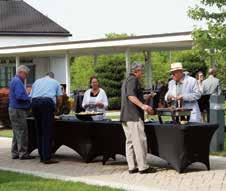
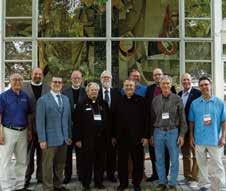
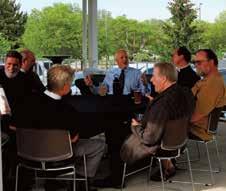



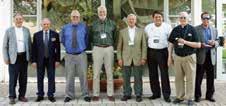



Spring 2023 31 Retreat, Relax, and Reconnect Register today! To register or for more information scan the QR code or visit us at ctsfw.edu/Alumni. For questions contact LeeAnna Rondot at (260) 452-2204 or LeeAnna.Rondot@ctsfw.edu Alumni Reunion May 18–19, 2023 All classes are invited. We will celebrate class years that end in 3 and 8. Come Golf with Us in May! Enjoy the day and help upgrade CTSFW’s athletic facilities! Location Cherry Hill Golf Course Fort Wayne, IN Cost (includes lunch, 18 holes, and beverages) $85 per player $65 for alumni, clergy, and students To register or find more information, scan the code or contact: LeeAnna Rondot LeeAnna.Rondot@ctsfw.edu (260) 452-2204 LeeA LeeAn (260) CTSFW Golf Outing Wednesday, May 17, 2023 Schedule 10:00 a.m. Registration & Warm-up 11:00 a.m. Lunch 11:45 a.m. Tee Off 5:30 p.m. Awards
November 13–22, 2023
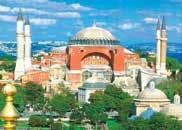






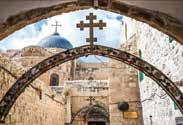

Hosts: Dr. and Mrs. Ryan Tietz
June
Hosts: Dr. and Mrs. Charles Gieschen
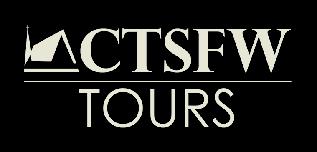
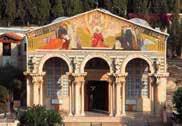
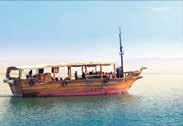
For the Life of the World 32 NON-PROFIT MAIL U.S. POSTAGE PAID BERNE, IN 46711 PERMIT #43 For more information contact Deac. Katherine Rittner: ctsfw.edu/CTSFWTours CTSFWTours@ctsfw.edu (260) 452-2119 STEPS OF PAUL TOUR 12 Days in the Steps of Paul to Greece & Turkey
2024
10–21,
THE HOLY LAND TOUR
Days in the Steps of Jesus
10
For the Life of the World Concordia Theological Seminary 6600 N. Clinton St. @ Fort Wayne, IN 46825-4996



























 Photo: Erik M. Lunsford/The Lutheran Church—Missouri Synod
Photo: Erik M. Lunsford/The Lutheran Church—Missouri Synod


























































 Don Wiley
Don Wiley










































